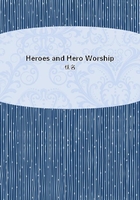
第14章
Of the distinctive poetic character or merit of this Norse Mythology I have not room to speak; nor does it concern us much. Some wild Prophecies we have, as the _Voluspa_ in the _Elder Edda_; of a rapt, earnest, sibylline sort. But they were comparatively an idle adjunct of the matter, men who as it were but toyed with the matter, these later Skalds; and it is _their_songs chiefly that survive. In later centuries, I suppose, they would go on singing, poetically symbolizing, as our modern Painters paint, when it was no longer from the innermost heart, or not from the heart at all. This is everywhere to be well kept in mind.
Gray's fragments of Norse Lore, at any rate, will give one no notion of it;--any more than Pope will of Homer. It is no square-built gloomy palace of black ashlar marble, shrouded in awe and horror, as Gray gives it us:
no; rough as the North rocks, as the Iceland deserts, it is; with a heartiness, homeliness, even a tint of good humor and robust mirth in the middle of these fearful things. The strong old Norse heart did not go upon theatrical sublimities; they had not time to tremble. I like much their robust simplicity; their veracity, directness of conception. Thor "draws down his brows" in a veritable Norse rage; "grasps his hammer till the _knuckles grow white_." Beautiful traits of pity too, an honest pity.
Balder "the white God" dies; the beautiful, benignant; he is the Sungod.
They try all Nature for a remedy; but he is dead. Frigga, his mother, sends Hermoder to seek or see him: nine days and nine nights he rides through gloomy deep valleys, a labyrinth of gloom; arrives at the Bridge with its gold roof: the Keeper says, "Yes, Balder did pass here; but the Kingdom of the Dead is down yonder, far towards the North." Hermoder rides on; leaps Hell-gate, Hela's gate; does see Balder, and speak with him:
Balder cannot be delivered. Inexorable! Hela will not, for Odin or any God, give him up. The beautiful and gentle has to remain there. His Wife had volunteered to go with him, to die with him. They shall forever remain there. He sends his ring to Odin; Nanna his wife sends her _thimble_ to Frigga, as a remembrance.--Ah me!--For indeed Valor is the fountain of Pity too;--of Truth, and all that is great and good in man. The robust homely vigor of the Norse heart attaches one much, in these delineations. Is it not a trait of right honest strength, says Uhland, who has written a fine _Essay_ on Thor, that the old Norse heart finds its friend in the Thunder-god? That it is not frightened away by his thunder; but finds that Summer-heat, the beautiful noble summer, must and will have thunder withal! The Norse heart _loves_ this Thor and his hammer-bolt; sports with him. Thor is Summer-heat: the god of Peaceable Industry as well as Thunder. He is the Peasant's friend; his true henchman and attendant is Thialfi, _Manual Labor_. Thor himself engages in all manner of rough manual work, scorns no business for its plebeianism; is ever and anon travelling to the country of the Jotuns, harrying those chaotic Frost-monsters, subduing them, at least straitening and damaging them. There is a great broad humor in some of these things.
Thor, as we saw above, goes to Jotun-land, to seek Hymir's Caldron, that the Gods may brew beer. Hymir the huge Giant enters, his gray beard all full of hoar-frost; splits pillars with the very glance of his eye; Thor, after much rough tumult, snatches the Pot, claps it on his head; the "handles of it reach down to his heels." The Norse Skald has a kind of loving sport with Thor. This is the Hymir whose cattle, the critics have discovered, are Icebergs. Huge untutored Brobdignag genius,--needing only to be tamed down; into Shakspeares, Dantes, Goethes! It is all gone now, that old Norse work,--Thor the Thunder-god changed into Jack the Giant-killer: but the mind that made it is here yet. How strangely things grow, and die, and do not die! There are twigs of that great world-tree of Norse Belief still curiously traceable. This poor Jack of the Nursery, with his miraculous shoes of swiftness, coat of darkness, sword of sharpness, he is one. _Hynde Etin_, and still more decisively _Red Etin of Ireland_, _in_ the Scottish Ballads, these are both derived from Norseland;_Etin_ is evidently a _Jotun_. Nay, Shakspeare's _Hamlet_ is a twig too of this same world-tree; there seems no doubt of that. Hamlet, _Amleth_ Ifind, is really a mythic personage; and his Tragedy, of the poisoned Father, poisoned asleep by drops in his ear, and the rest, is a Norse mythus! Old Saxo, as his wont was, made it a Danish history; Shakspeare, out of Saxo, made it what we see. That is a twig of the world-tree that has _grown_, I think;--by nature or accident that one has grown!
In fact, these old Norse songs have a _truth_ in them, an inward perennial truth and greatness,--as, indeed, all must have that can very long preserve itself by tradition alone. It is a greatness not of mere body and gigantic bulk, but a rude greatness of soul. There is a sublime uncomplaining melancholy traceable in these old hearts. A great free glance into the very deeps of thought. They seem to have seen, these brave old Northmen, what Meditation has taught all men in all ages, That this world is after all but a show,--a phenomenon or appearance, no real thing. All deep souls see into that,--the Hindoo Mythologist, the German Philosopher,--the Shakspeare, the earnest Thinker, wherever he may be: